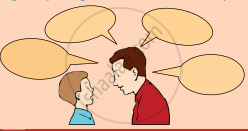Advertisements
Advertisements
Question
Can you call ‘The Castle’ an allegorical poem? Discuss.
Solution
The castle is doubtless an allegorical poem. The outward strength of the castle is matchless. It is fortified well. It has brave soldiers and large quantity of arms are stockpiled. The castle houses well stocked granary also. But the castle also conceals the ingredients of personal downfall within. If a person does not look within, their doom may be unstoppable. It is very difficult to protect oneself against greed, particularly the love of gold, instilled deep in the psyche of human beings. People say, “everything is fair in love and war.” People resort to anything to win in a war. Gandhi said, “the end never justifies the means.” But in times of war people stoop down to any betrayal to win. Thus, the castle is an allegorical poem.
APPEARS IN
RELATED QUESTIONS
Human greed led to the mighty fall of the citadel. Explain.
Read the given line and answer the question that follow in a line or two.
| Oh then our maze of tunneled stone Grew thin and treacherous as air. The castle was lost without a groan, The famous citadel overthrown, |
- Bring out the contrast in the first two lines.
- What is the rhyme scheme of the given stanza?
I will maintain until my death
Underline the alliterated word in the following line.
The wizened warder let them through.
Identify the figure of speech used in the following line.
A little wicked wicket gate.
Why is the casuarina tree dear to poet’s heart?
Read the line given below and answer the question that follow.
A creeper climbs, in whose embraces bound No other tree could live.
- Which tree is referred to in the above lines?
- How does the tree survive the tight hold of the creeper?
- Why does Toru Dutt use the expression ‘a creeper climbs’?
Explain the following line with reference to the context.
It is the tree’s lament, an eerie speech,…
Identify the figure of speech used in each of the extract given below and write down the answer in the space given below.
“ LIKE a huge Python, winding round and round
The rugged trunk indented deep with scars”,
Discuss with your partner the different stages in the growth of man from a new born to an adult

Describe the second stage of life as depicted by Shakespeare.
Which stage of man’s life is associated with the ‘shrunk shank’?
Complete the table based on your understanding of the poem.
| Stage | Characteristic |
| crying | |
| judge | |
| soldier | |
| unhappy | |
| second childhood | |
| whining | |
| old man |
Who does the speaker address in the second part?
In what ways were Ulysses and his mariners alike?
What could be the possible outcomes of their travel?
Identify the figure of speech employed in the following line.
There lies the port the vessel puffs her sail
Read the set of line from the poem and answer the question that follow.
That ever with a frolic welcome took
The thunder and the sunshine, and opposed
- What do ‘thunder’ and ‘sunshine’ refer to?
- What do we infer about the attitude of the sailors?
Read the set of line from the poem and answer the question that follow.
One equal temper of heroic hearts,
Made weak by time and fate, but strong in will
To strive, to seek, to find, and not to yield.
- Though made weak by time and fate, the hearts are heroic. Explain.
- Pick out the words in alliteration in the above lines.
Explain with reference to the context the following line.
I am become a name; For always roaming with a hungry heart
Explain with reference to the context the following line.
How dull it is to pause, to make an end,
To rust unburnished, not to shine in use!
Explain with reference to the context the following line.
He works his work, I mine.
What makes Ulysses seek newer adventures?
Every parent is anxious about the welfare of his/her children. Parents express their anxiety by advising them almost all the time. What kind of advice do you frequently receive from your parents? Fill in the bubbles. Tick the ones you like to follow implicitly and give reasons for the ones you don’t like to follow.

Read the line given below and answer the question that follow.
“Life is a soft loam; be gentle; go easy.” And this too might serve him.
- Why does the poet suggest to take life easy?
- Identify the figure of speech in the above line.
Explain how the poet guides his son who is at the threshold of manhood, to face the challenges of life.
Where did the rider plant the French flag after Ratisbon was captured?
Why did Napoleon’s eyes become soft as a mother eagle’s eyes?
